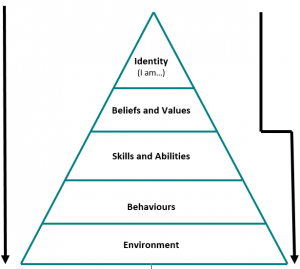Wimbledon is a fabulous sporting roller coaster. One of the reasons I enjoy watching is because it is such a good example of how self-belief impacts so directly on what we can achieve. Players ‘tightening up’ as they approach match point, or winning a set easily before loosing the next one with a look of despair on their face. I love that sense of jeopardy.
Andy Murray has given us great examples of moving from triumph to disaster (and back again!), his body language hinting at what can happen when inner thoughts impact on physical ability, (I’m keeping my fingers crossed he ends on triumph in the semi-final this afternoon!!) The tears at Wimbledon when he lost in the final in 2012 were perhaps those of a man so driven to succeed, with so much pressure on his shoulders and a sense that his best was just not good enough. In more recent times, maybe with the realisation that sharing emotions is OK, he seems more comfortable with himself and the reality that, like all of us, he is not perfect.
At a Dutch tournament a journalist snapped a photo of Andy’s motivational notes. The top one was
Be good to yourself
Such a simple message.
What we believe about ourselves and the impact that it has on what we are able to do is something that we have explored already through the idea of alignment (blogs of 1st and 15th May 2015). We know that we are at our best when we believe we are the person who can do the things we are asking of ourselves, and that alignment is represented here by the line on the left of Robert Dilts’s Neurological Levels Triangle:
Being aligned can help us in any situation, but as well as walking out on to the tennis court feeling confident and aligned (or on to the stage for a presentation, or in to a party where we don’t know anyone, or …), it would also be great, wouldn’t it, to stay that way even if things don’t go well.
How resilient are we in the face of adversity? How much evidence that we are not up to the job does it take before we start to doubt ourselves? How many serves into the net, returns just out, heckles from the audience or time standing in the corner at the party on our own does it take before we start to doubt ourselves? How fragile are our beliefs about ourselves?
One of the key themes running though the work of Will Schutz, creator of the Fundamental Interpersonal Relationships Orientation framework (FIRO for short!) and author of the great book “The Truth Option” is that self-awareness and self-regard enable us to be our best selves. Knowing ourselves, warts and all, and still loving ourselves means that when something goes wrong it doesn’t damage our sense of who we are, it just gives us choices about what we do about it. We can move from ‘I am useless’ to ‘I need to do that differently’: we can start to take feedback at the skills, abilities and behaviours level, rather than letting it impact on us at our identity level. And so we don’t need the ‘glitch’ represented by the line on the right hand side of the triangle above.
So there can really be truth in the old saying
there is no failure, only feedback
I get things wrong all the time, including when I am working. That doesn’t mean that ‘I am a rubbish trainer/coach’: I don’t need to wear those imperfections at an identity level. All it means is that I need to brush up on something so that I can do it better. When Andy Murray serves a double fault it doesn’t change who he is, but he may want to go and practice his serve. You, me, Andy Murray, we are not what we do, we are who we are. And so, whilst we may be cross that we got something wrong, we can still be good and kind to ourselves!
On the other side of this coin of course is the reality that we are only able to offer feedback to others on what they do as that is all we know. But how often do we confuse behaviours with identity when we tell others what we think? How often do we say ‘I hate you’ when what we mean is ‘I hate it when you do that’?
As we are good and kind to ourselves so we can be good and kind to others too.
When you get something wrong how ‘good to yourself’ are you?
As a footnote, we are 10 years on from those horrible events of the 7th July 2005. Whilst I believe in free will and the concept of choice, sometimes it seems impossible to understand the choices others make. I wish for a world where good and kind is always who we are and what we do.
Thank you for reading this blog. I am enjoying sharing the Choose You Project with you and it is lovely to hear that so many of you enjoy reading it. Do keep sending your thoughts and reflections to jenny@insight-out.co.uk
I look forward to sharing more thoughts with you in a couple of weeks,
Jenny

